A chat with double world 100km Champion Ellie Greenwood
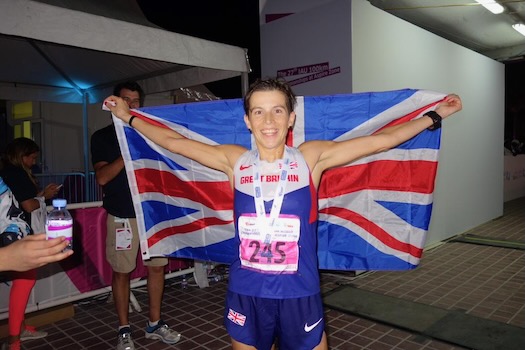
For a period from around 2010-2016, Ellie Greenwood was one of the best ultra runners in the world.
She won the IAU world 100km championship on two occasions. At Gibraltar in 2010 and Doha in 2014. Ellie also won the Comrades Marathon in 2014, and to show her versatility on the trails, she recorded victories in Classic trail races, the Western States hundred mile in California, and CCC in Chamonix, both in 2012.
Originally from Scotland, where her parents still live, she spent several childhood and teenage years in Norfolk, England.
She has lived and worked in Canada for many years, making Vancouver her home over 10 years ago.
I caught up with her for an online chat in the week of the 10th anniversary of her second World 100km victory, on 22nd November 2014 at Doha. She had just returned from a trekking holiday in Nepal.
Sign up to receive our newsletter alerting you to NEW POSTS
AS. Hi Ellie. How are you? Have you recovered from Nepal?
EG. Yes. I got back Saturday evening, but there is a 13-hour time difference with Vancouver. So yes. I’m still in the “waking up for a few hours in the middle of the night zone.”
I’m mostly functional, so that’s good. It was a super trip. Really good.
Where are you and what are you doing now?
AS. For people who don’t know, tell us, where are you now? Where is home?
EG. Vancouver is where I live. I’ve lived here for the last 12 years.
AS. For the record, what are you doing for work these days?
EG. Coaching with Sharman Ultra. That’s full-time time other than every Thursday when I go to work at a local running store one day a week to be social.
AS. Fabulous. We might come back to coaching a bit later, depending on how much time we have.
How did you get into running?
AS. I recall you first coming on my radar when you won the wonderfully named, Elk Beaver 100k in Canada.
I’m also aware there is a whole generation, even in the last three or four years, let alone the last 10 years, who probably don’t know your background. How did you get into running in the first place?
EG. I always liked jogging, like, you know, as a teenager.
Then, I was at the University of York and decided to do the Great North Run.
NOTE: The Great North Run is one of the world’s largest mass participation half-marathons held annually in Newcastle, in the North of England.
I was like a student. What was I? 21 or 20. Probably 21. And I just thought, oh, that would be fun. I’d always watch the London Marathon on TV and actually thought, oh, that looks fun too. So yes, I did the Great North Run.
Then, the following year, I first came out to Canada. My work manager, well, it was him and me in the office said, “Oh, you know, we’re doing a half marathon next week, me and some friends. Why don’t you run too?’
So I said, “Yeah, sure, I’ll do that.” And then he said, “Oh, we’re doing a full marathon four months later.” So I went to a running store, the one that I now work at, to do their running clinic. You know, every Sunday, long run and Wednesday speed work. That was the start of it. So it all started in my early 20s and was very recreational and social.
AS. Then it became a slippery slope after that?
EG. That was probably about 2002 or 2003.
AS. So when did you do your first ultra?
EG. I think it was 2005.
It was called the Club Fatass 50K, and it was on January 1st in Vancouver. It’s not really a race. It’s like a group-run kind of event. By then, I’d probably done a small handful of marathons. I just thought it sounded fun. It was a bit of road and a bit of urban trail. Then I got into running local 50 K’s, mostly trail races.
AS. And the Elk Beaver 100k, was that the longest you had run up to that point?
EG. Yes. I had done a 50-mile trail race here in Canada. (The Stormy 50 mile at Squamish in Bbritish Columbia.) The same one twice. The race director in Squamish in BC, Wendy, had been on the Canadian 100k team. She said, “Well, Ellie! With the time you’ve just run at this race, you could cut the top 10 at World 100K, which I thought was ridiculous. So then I thought, oh, well, I’d better try and qualify. So I went and did Elk Beaver, which is a tiny race. It’s like a 10km gravel loop that you do 10 times over in Victoria, BC, and it was the longest one I’d run at that time.
I had run 50 milers that probably took me just as long, if not a bit longer, but they were like tougher terrain. I did go expressly with the idea of like, maybe I could qualify for the World 100k.
Making the Great Britain 100km team
AS. I forget now, did someone contact you? Or did you contact Norman at the time?
EG. No, I contacted Norman.
NOTE: Norman is Norman Wilson, who was leading the GB ultra selection group at the time.
EG. I must have found his email somewhere. I kept sending a few emails and didn’t get a reply. Then I contacted Lizzie Hawker, who I was an absolute fan of saying I was trying to contact Norman and if was he the the right person. She confirmed he was and I ended up sending a letter. Sounds funny now but I physically mailed a letter to Norman with a stamp, because I hadn’t heard anything. Anyway, he then got back to me and I ended up getting selected for the team.
AS. Fast forward a few months, and you’re in Gibraltar with Lizzie.
EG. Yes! With Lizzie. Yes.
AS.Be Honest! Were you a little starstruck or not?
EG. I mean, Lizzie was, and I still say she still is, a fantastic runner.
I feel she’s a similar generation to me, but she was that little bit earlier, right? She’d already got these amazing results and she had this huge profile and, you know, this kind of stuff. So I guess I was extremely excited to be on the team with Lizzie more than anything else.
World 100km Championships, 2010, Gibraltar.
AS. From a running point of view, I don’t know how it worked out, but from an organisational point of view, there was a big hiccup with the course in Gibraltar. It ended up being slightly short anyway. But as the race unfolded, it became apparent to the organisers that they were doing the wrong loop or you’ve taken a wrong turn somewhere.
EG. Well. We had this figure of eight at the start, and then we went off onto this loop that we were to do, I believe, 17 times. From what I know, it is just because I was there. We had the head of the Gibraltar police on his motorbike leading us. You know. Making sure everybody got onto the main course. We did the one part of the figure of eight, right? Then there was this pause, right?
Of course, all the men are ahead of us and I remember thinking, “No, we should go up here”. But there was a moment of thinking, ” Where do we go?” Which was ridiculous because it wasn’t that complicated.
I can’t remember his name, but a guy on the GB team said, “It’s up here.” And I thought, well, “No, it isn’t.”
But okay, the race is carrying on, and off we go, right? Then we got onto the main loop, and we were told after a while that one loop was going to be shorter. Someone had twigged there had been a mistake and they were remeasuring the course as we were going. So we were to do this loop 17 times, but on one of the loops, we were told, “Don’t go around there. Just go up to that bollard and go around it. I remember Mike Wardian from the US saying, ” Ellie, short loop coming up.” And I was like, “No, I’m a loop behind you. It’s me on the next one.” Anyway, it was all a bit weird and we never got told it was short in the end. I only found out after the race because a friend told me he’d read something online.
AS. They did the best they could, but it still ended up being around 100 metres short.
EG. I was going to say, I think it was something like 90 metres or just less than 100 metres, but basically, they were remeasuring the course as the race was going on.
AS. As a course measurer myself, I can relate to that conundrum!
Despite that. In the end, Ellie Greenwood became the World Champion.
EG.Yeah.
AS. How did that feel?
EG. I mean, it’s interesting. I don’t know what my goal would have been going into that race. I mean, Wendy, the race director from back home, had said I could come in the top 10. So maybe I thought top 10. I didn’t really know, right? I was a little starstruck. I’m wearing a GB kit, and I’m on this team, and I don’t really know anybody, and nobody knew who I was either. So I was on this British team and I think initially people thought, “Who are you?” Not in an unfriendly way, but they were like, “Where have you come from?” Well, Vancouver, right?
I had quite a rough race in a lot of ways. I mean, I only took the lead with about seven kilometres to go. I think I was probably very surprised to win but, I am not going to complain.
AS. Your race was well documented in one of your blogs. I’ll put a link to it at the foot of this post
So in those years, you’ve established yourself as one of the best women ultra runners of the time, certainly without any doubt, in my humble opinion.
You entered Comrades in 2011?
EG. 2011 was the first one I did, yeah.
Comparing Comrades with World 100km Championships
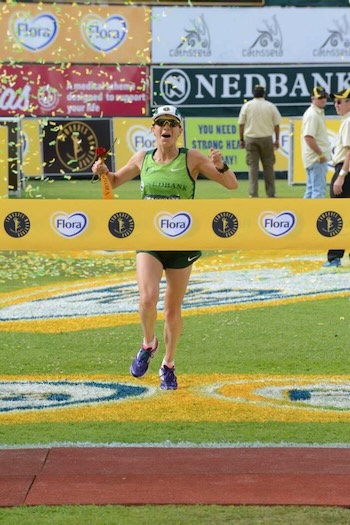
AS. How was Comrades compared with going to an IAU World Championship?
EG. I would say it’s entirely different, Adrian. Have you been to Comrades?
AS. I’ve never been to Comrades, but I obviously know its history and where it stands in the global ultra scheme of things.
EG. OK, you must get yourself there. So it was Norman who pushed me to do it. He managed to get a bit of funding from UK Athletics. He also got me onto this Nedbank team, which is like a South African club. That was very helpful. I’m not going to say it’s essential, but it’s very helpful to be on one of those teams. It’s just a much bigger event with 16,000 people. I don’t know if it’s comparable with like, marathoners winning Boston Marathon or going to a world championships.
Because, yes! For the World 100k, we’ve all qualified to be there, but
it’s a relatively small field, about 200 runners. Whereas Comrades is just huge with thousands of people and the whole country knows about it. And it’s on live TV. It’s like so much bigger. I guess, in some ways, you don’t have to qualify. Any capable runner can go get the qualifier and run it they’ve got the ability. But it’s a huge event with a high profile, so you feel much more pressure going to a race like that than going to a World Champs and chasing medals. There’s prize money involved as well at Comrades.
I felt pressure when I was in my first World Championship because people were like, who are you? Right, like, you know, how have you got on this team? Like, we’ve never heard of you. I would say Comrades was a different pressure because you were running for this running club, which wasn’t any big shakes to them. After all, if you did badly, they paid for a few night’s hotel and ferried you around a little, right? But you did feel it wasn’t like going to Elk Beaver 100k, where I was running just for myself. It’s a different kind of pressure, and a different vibe with that many people, right? The weird thing is, you can get very good runners at World Championships, but you can only have so many Brits, Americans, Italians or whoever. However, you can have 10 of the best Americans and South Africans or more at Comrades. So it’s just different. Certainly, there is pressure because you’re on a team again. You’re not the unknown first-timer, as it were, right?
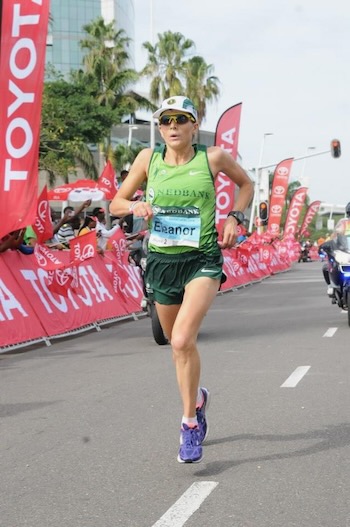
AS. Your adventures at Comrades went pretty well, which are also well documented. Just fast winding back a little bit, the year after you won the World Champs, you were in the GB 100km team at the World 100km in Winschoten in The Netherlands.
EG. Yes, it didn’t quite go to plan. That was 2011.
I had a bad stomach and was vomiting from about 45k.
In a cool way, I think I’d already vomited in a race earlier that year. So I thought, well, I’ve got the solution. This is what I’ll do. But no! I just carried on vomiting. I think I probably felt a bit of pressure as well, having won the year before.
I mean, I think that’s a by-and-by.
It was very humid, which was quite odd, right? We didn’t expect that in Northern Holland. So I was vomiting and couldn’t keep anything down and dropped out at 90k.
World 100km Championships Doha 2014
AS. Well, we all have races like that, which don’t go as planned. But you get your redemption, which is probably the wrong word, but fast forward to 2014 and you’re on the GB 100km team again in Doha.
All these things, cycles and at that time, Doha were putting money into athletics generally, ultra racing and other sports as a way of promoting themselves.
What were your feelings about going to somewhere like Doha to run a championships?
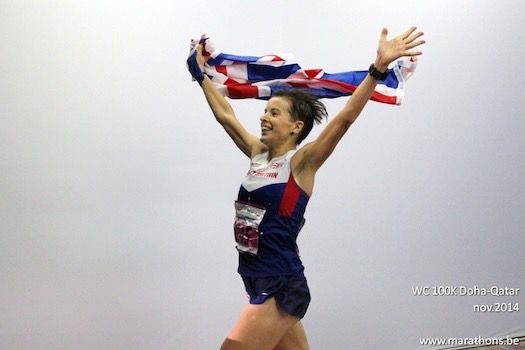
EG. I think I was mostly excited.
You know, I hate to say it, but it was a country I probably wouldn’t have gone to otherwise.
Also, by this time, I had won Western States, and I had already won Comrades earlier that year. I was a much more experienced runner than in 2010, or even honestly, 2011. At that point, I felt like I’d got my place on the team, and I fit in here now. Okay, I probably wouldn’t go to Doha if there wasn’t a race, but this is kind of cool, right? I mean, they had held the 50k championships there. I think it was three weeks before we did the 100k. I felt we were at an advantage because you heard the horror stories about the course, right? I mean, I had done sauna training for the heat. Ultimately, I don’t feel like it was that hot, but I felt like the runners who had gone and run the 50k got to feel that the surface was really hard to run on.
There was also this very small incline on each lap.
When we got there, it was like. “This is what they’ve been talking about.” I felt they were the guinea pigs for us.
AS. It was a very strange-shaped course, like a weird figure of eight weaving around the Aspire complex. And yes! Those cobbles were very hard.
EG. The cobbles were very hard. What I didn’t understand either was, there is this American, Emily Harrison, who did the 50k. She said, there’s this kind of out-and-back section where you did a 180-degree turn and came back down. And she said, “Oh! You know, then it’s downhill”.
And I thought, well, this course isn’t downhill. But it was. Because it was 5k loops, by the time you’re done with 20 loops you feel it. So yeah! It was a weird course and we were running in the dark. That didn’t bother me, and there were enough spectators. I mean, there weren’t tons, but there was enough to create an atmosphere. Although it was incredibly hot during the day, because the race started early in the evening, at 6 or 7 pm, that probably helped us.
AS. You were running in the cool of the evening and finishing at “stupid o’clock” in the morning.
EG. Yeah, well, it was pitch black when we started, right? Like in all the photos, it’s like nighttime, right? I mean, I’ve never started a race at that time of day, but on the other hand, it is the same for everybody. When you’re halfway around the world, does your body even know what day it is anyway? We probably finished at 1.30 am or 2 in the morning. It was late, but it’s not like it was 4 am.
AS. I do recall, probably because everyone was there, it was just such a surreal atmosphere. The whole Aspire complex where the race was held was just quite surreal anyway, just plonked in the middle of the desert.
EG.Oh yeah, no. I mean, and I think that was it. You had to go like, “This is going to be unlike any other race I’ll ever do, but I’ll embrace the novelty of it. It’s dark. I’m in the desert. There’s the big torch-shaped hotel which is all lit up and very fancy. And, you know, we’ve been told we have to dress respectfully. In the GB kit allocation, they didn’t even give us sports bras, because they didn’t want you running in them. So, you know you had all these local spectators with their long covered-up robes running around, but you have to embrace it for being different. Having said all that it was an excellently organized race, which is all that matters.
AS. You ended up being crowned World 100km Champion for the second time. Tell us how the race unfolded. I think you almost went into the lead by default because everyone just started dropping back.
EG. People started, well, not “fast fast,” but I was feeling, “No. That’s too fast. And I even backed off to start with. I remember Eleanor Robinson saying to me, like, “Ellie, I wouldn’t go much faster.” You know, she didn’t say slow down. I thought because it was her, although I didn’t know all of Eleanor’s accolades at the time. I was like, oh, she knows what she’s talking about. OK, better not go faster.
NOTE.Eleanor was in Doha with the GB support team, and herself, a former two-time world 100km champion.
EG.I think people just came back to me. Unlike Gibraltar, it was maybe at 40 or 50K I was in the lead, but again, I had more experience by that point. So I was like, OK, well, I’m doing my race, and I am on the pace that I think I want to be on. By that point, I determined that the heat didn’t seem to be slowing me down because we all thought maybe we’d all run slower in the second half. I thought, well, I don’t feel heat is an issue, so I’m running at the pace that I think I can run at.
It was neat because we had that 180-degree turn on the loop.
I could see the two Jo’s behind me, which was neat, and there was the Japanese lady, sorry, I don’t remember her name, who came second. So every 5k, you could tell, “Oh, they’re not gaining on me, or they are. ” which was super helpful.
AS. With Jo Zak and Jo Meek closing in well, you secured the team gold medals as well with Emily backing you up as the fourth counter. Very few 100k’ team contests are won with first, third, and fourth placings.
NOTE; The GB women’s team was Ellie, who won, Jo Zakrzewski, who came third, and Jo Meek who was fourth. Emily Gelder was the fourth team member who finished in 19th place.
EG. I know. And I will say knowing each other was a big part of it. I can’t remember how I knew both Jo’s by then. Jo Zak had been on the team at Winschoten in 2011 and we kept in touch and met again at Comrades and Jo ( Meek) maybe there too. Emily had been on the team in Gibraltar in 2010. It was very neat for us all to be there. It was awesome.
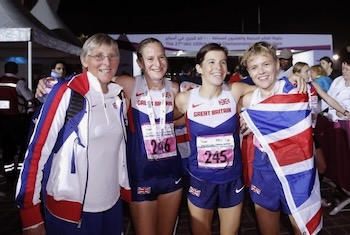
I really felt we were a team who knew each other. Whereas, say, Gibraltar, it was like, “Hi, nice to meet you.”
It was good being on a team, and you can see that your teammates are doing well too.
Trail running versus Road Running
AS. So amongst all this running on tarmac and cobbles in the middle of the desert, you also run on the trails quite well.
EG. Yes.
AS. Not many people can combine being good on the roads and the trails. How did you find the switch between training and aiming for Western States or Comrades because you did Comrades and Western States just a month apart in 2011?
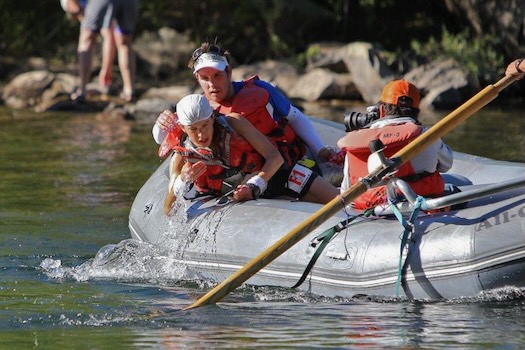
EG. Yes.
I mean, I feel living in Vancouver helps, as it is somewhere great for running, right?
Like, we could run around the seawall. It’s 10k pancake flat. So if you want a pancake flat traffic free run, off you go, and there you have it. If you want mountains, we can go 2k up the road. So I mean, I was fortunate to live somewhere where it was possible to train for everything, though I did live in Banff in the early days.
I also slightly feel, “Could I have been better at trail running or road running if I had focused on one or the other? Possibly. If I said, “Right I am going all in on roads, right? Because something I would have loved to have done is run 100k faster, right?
But then I didn’t get bored, right? Because it might be, “Oh. I’m training for a road race.” and then, “Oh, now it’s summer, and I have a bit more of a trail focus. It felt like mixing it up. It wasn’t the same old, same old, like, sort of all year round. So I think that was good from a mental perspective. It gave me a varied skill set. Some road runners might be intimidated by the hills at Comrade while I’m like, well,
“I’ve done much hillier road races.” Then you might get to the Western States, and some trail runners would be like, “Oh, this is very runnable.” And I’ll be like, “I’ve run 100k round in circles,” so I could do runnable. I will admit maybe, and then you never know, could I have been better if I’d focused on one or the other. But I think it kept me engaged. I was always touching base with whether it was a bit of speed or hills or whatever. I don’t mind admitting that Western States is very runnable. However, I did win CCC, which I think is a legitimate technical mountain race, right? I was probably better at the trail races that were the very hilly but runnable type, rather than the pure mountain ones.
AS. You ran Western States in 2011 and 2012, winning on both occasions and breaking Ann Trason’s long-standing record in 2012.
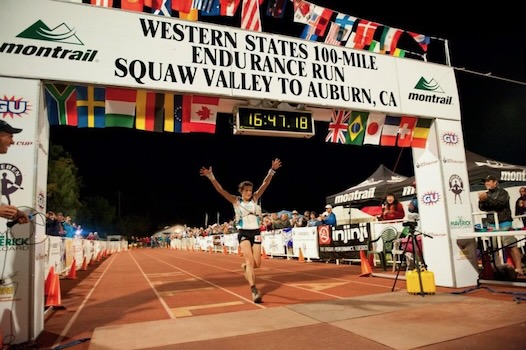
Then you had the record for several years until Courtney came along. Then, last year, I think five people got inside your time or got inside 17 hours.
EG. I can’t remember exactly but it was ridiculous. Just ridiculous.
How has the sport changed in the last 10 years?
AS. This leads me seamlessly into my next question. In the last 10 years, although you’ve obviously been around the scene. You haven’t left the scene and you’re still totally involved in it with your coaching.
Leaving aside the whole base of the pyramid, which has just got huge with the explosion in trail running. It just seems such a busy scene now. What changes do you see and feel have happened? Some for the better? Some for the worse? Discuss.?
EG. Discuss indeed? Okay. I mean, we all think the era we ran in was the best, whether that was your era, Adrian, or mine, or the people running now, like, this is the best. So, because we all have these rose-tinted glasses of the experiences that we had, or whatever.
I don’t want to be missing some bias for the 2010 to 2015 era. I think any changes are mostly for the good.
I mean, trail running in particular, has got way more popular.
I think more road runners have come into trail running, and it is a bit more competitive. That breeds people who want to do well, and it means people have to step it up a notch, and that’s great. I also even feel, and again, I’m not quite so connected, but I don’t mind admitting my world 100k times would not have won in the last few years, right? Things are moving on.
I feel there has been more interest, in recent years, in 100K and 24 hours, which I think is neat that you can have both, right? I mean, what’s changed is the depth of competition for sure.
But then, there always were very good runners. I don’t need to tell you that, right? You go back to Eleanor Robinson or Ann Trason, whose record stood at Western States for 18 years before I broke it. She’s now dropped way down.
I think in trail running, there probably is more money now, too.
I don’t know how much, right? I’m not that connected to know that kind of thing. Whereas, I feel I was very much of a generation who still had jobs. I worked full-time for a travel company, and running was something I found I was good at and did for fun. I did it very seriously, but it was like, after work, I’ll go training. I feel there are more people now that can maybe work a little less, or they have got a job like I do now, like coaching where you could pick and choose, but it’s related to running.
Am I allowed to say that I think shoes have changed things in the last few years?
AS. Of course you can! You would not be telling any untruths there, I don’t think.
EG. I do think the benefits road runners have seen are even starting to come into trail shoes too. I was sceptical of carbon shoes for trail running. I was like? I don’t know how this makes sense, but then you start to think, “Well, maybe they could work for some trails. I don’t know. I’m sure if I was running World 100K now or Comrades. I’d be wearing carbon shoes.
AS. I am sure you would be. I think, whatever one feels, the genie’s out of the bottle on that one now, so we can’t put it back in.
EG. Exactly, exactly. The popularity of the trails has brought more media, right? I mean, like there were already some sponsored athletes 10 years ago, you know. I was of a generation where I had sponsors and I did get some money I was grateful for. I’m not saying that Comrades Prize money wasn’t already great, right?
But I feel more runners are trying to make a living, and it is more popular with live race coverage and that kind of thing.
Dealing with Injuries
AS. Towards the end of your career, you had several injuries. It’s been well documented, not just from an elite point of view because it happens to so many runners of all abilities. I see a lot of runners who are pushing their boundaries to improve and either burn out, get injured, or both. Unless they are very lucky, they all have a period where they go through little ups and downs.
You had some major downs with injuries.
If you were trying to take the positives out of it for anyone who is going through six months to a year where they don’t think there’s light at the end of the tunnel. How do you deal with that?
EG. Yes, I think the main injury I had when I was still running well was a stress fracture in 2013. I can’t run much at all in any way now but would be delighted if I was running enough to get a stress fracture these days.. I don’t want to say I was a bad example because people will say, “You ran ultras, so you expect to get injuries.” But I know a lot of people who run ultras who didn’t get bad injuries either. But yes, in 2013, I got a stress fracture, right?
I heard Charlotte Purdue being interviewed on a podcast about her injury issues, and she was saying that you have to accept that running is an injury-prone sport and it’s part and parcel of it. So I think if somebody’s injured for six months to a year, you have to look at it like it’s unlikely to be forever.
Most of these races take place every year. Right. And again, I don’t know if this is the pressure these days because I had a full-time job that had nothing to do with running, right? Whereas I can see the more professional some become, it becomes like, “This is my job, and people have these expectations of me.” But I think you have to say, “It is what it is.” And then I always say that there are two ways to go. You either say “I’m not going to have anything to do with running for the next four months or whatever, and I’m going to ignore all the people I know that are runners, right?” Or you do the, like, ” I’ll go and help out at events and volunteer and stay engaged,” because you can stay engaged in many other ways in the sport, right?
So, I feel that is what I’ve done. But yeah. Most injuries you can work your way through. So it’s part and parcel.
What I will say is you see more and more these days, runners running very well into their early to mid-40s. I feel it’s more highlighted for women, right? So if you have an injury and you’re like, 32, don’t worry. There are still good years ahead of you. Right? I think there is that idea of, ” Oh, well, I’ve missed a year,” and then it’s this and whatever, right?
Well, the older you get you probably do start to think, “Wait a minute, this isn’t so ideal.” But then you see people like, you know, Devon Yanko still running very well and you see what Camille Heron’s done, all sorts, right? So it’s not the end of the tunnel if you get injured when you’re like 32 or 34.
Coaching with Ian Sharman’s team.
AS. You’re coaching a lot these days.
EG. Yes.
AS. Talk to us a little bit about what that involves. Are you coaching total beginners, middle of the pack? Elites? Or is it just a whole spectrum you do with Ian?
EG. Yeah, so most of the people I coach, I class as very enthusiastic middle of the packers, right? I say very enthusiastic because they’re dedicated enough to their running that they want a coach. They want to be following a plan and they’re not just like, “I’m going to race and be totally unprepared.” Right. I do coach some faster people, right? But no. I would say I coach more people who are trying to make cutoffs than people who are trying to win, put it that way, right? Most people are very dedicated, they love their running, they just want to get better, or they have signed up for a longer distance and they’re not really sure how to tackle this, right? Or they just want accountability or somebody with expertise, right? They might be busy professionals who don’t have time to be doing all the work themselves. So it’s online and I have people from everywhere. I just talked to a guy yesterday I coach in Iraq!
AS.Okay.
EG. Okay, so I have Iraq, I have Hong Kong, like Europe, Denmark but mostly North America. I would say most people are in their 30s and their 40s and they just love their running and they appreciate the guidance and having someone to help them along their running journey.
AS. I can just feel that from your enthusiasm and the way you’re talking now, you must get a big buzz out of just seeing people realize their goals.
EG. Oh yeah, totally. I mean, I do always say to people, I coach, there is like zero pressure from me. I say it in a way that I don’t care how you do. I only care because I want you to do well for yourself. Do you see what I mean?
So I’m never going to be like, “I’m disappointed that you didn’t run whatever in your marathon, or I’m disappointed for you because you trained hard and I think you could run faster.”
It’s no skin off my back. Some people need somebody just to, I don’t want to say hold their hand, right, but I am there to guide them along the way and feel invested in their running, and I am quite invested in my folks running.
Trekking in Nepal and the future.
AS. You’ve just been hiking in Nepal?
Was that Fun?
EG. Oh, it was amazing but I very much did a tourist trek, Adrian, right?
Like some people say, “Oh, you’re doing a big adventure.” but I’m doing a regular tourist trek. I last went to Nepal 20 years ago, and I always said I would go back again. I do a lot of hiking these days because I can’t run so much. I mean, I live in a place where it’s very easy to go hiking, like, you know, pretty much right out my back door.
Nepal is so set up for hiking, with all the tea houses and the guides. It’s just the culture is wonderful, and the scenery is beautiful. So it was delightful.
AS. What does the future hold? Carry on coaching? Carry on hiking?
EG. I like the coaching, so why wouldn’t I carry on doing it? That’s one thing I should say. I’m benefiting from the growth of the sport in the last few years and now it’s typical to have a coach, right?
I’ve done it now for 10 years, So yes, I think more hiking, because I like being outside. I like being active. I go to the gym a bunch, which is not so much running, but it’s good to stay fit. And yeah, I love the coaching.
Then, like I said, I work one day a week at a running store, because it keeps me involved in the local running community, which I appreciate as well.
AS. One last question has just come up while we’ve been chatting. I know you were born in Scotland, but you don’t have a Scottish accent.
You’ve got this lovely Norfolk accent. I Love it. Just love it. What do people in the States and Canada say when they meet this girl with an accent like yours?
EG: I should say it’s a terrible Norfolk accent. I’d prefer to have an accent than not have one,
I mean, people over here don’t get the different accents quite as much, right? I’m very proud to be Scottish, but generally, partly because of my accent, if people say, “Where are you from? I’m like, from the UK. And then they say, “Oh, I went to England.”
And I say, “Oh, that’s nice. I’m from Scotland!”
Of course, if people vaguely know an accent, they look at me and think, “I clearly don’t really have a Scottish accent.”
I’ve also been a Canadian citizen for 10 years and now have dual nationality. I’m very proud to be both British/Scottish and Canadian. My parents still live up in Fife, near Dundee right? I come home maybe like once a year or so. It’s near where I lived until I was like eight when we moved to Norfolk.
The upcoming 2024 World 100km in India?
AS. Last question I have is, “Will you be following the 100K Champs in two weeks in India?”
EG. Well, I will now you have mentioned it. I was aware it was in India, but I am a bit out of touch.
I hate to say it, but I don’t know who’s on the British team or the Canadian or the American for that matter. Now I’m intrigued.
AS. There is a whole new generation of runners.
EG. This is what I was thinking the other day.
I feel like there’s a whole new generation and I feel we’re almost getting on to the next one. For a while, I still felt like I competed with some of these people. Then, it got to like, “.There’s not many people I know.” I mean, there are obviously still people running, but probably not the real top ones, right?
I will be eager to see who is running now. India’s an interesting choice.
AS. India has money just now to invest in promoting themselves through many sports.
EG. Ok.
AS. It’s in Bangalore, or Bengaluru as it is now, which is down in the south. It’s not at altitude as such. It’s about 3,000, or 4,000 feet up, so it’ll be cooler. It’s not like sea level, and it’s not really altitude.
We’re looking at temperatures in the high teens at 6 am, race start, rising to mid-twenties by 4 hours into the race and high twenties after 6-7 hours in the middle of the day. Possibly, this time of year.
EG. What’s the course like?
AS. It’s a 5K loop around a university campus.
EG. Are good teams going?
AS. The full entry isn’t available to view yet, but on paper, GB have strong mens and women’s teams. Japan will have a strong team too.
With it being in India, the heat and humidity will be a factor, and it could turn into a true championship race without super fast times.
EG: Ok I will have to check that out
AS. Ellie. It’s been great talking to you.
EG. It was lovely talking to you too, Adrian. Take care. Thank you for the opportunity. I really appreciated it. It was nice to catch up. Good luck for the team in India
Chatting with Ellie, it is so obvious she maintains almost a childlike enthusiasm and a huge passion for running still.
You can read more about Ellie’s adventures at her blog HERE
More information on Coaching from Elie and Ian Sharman’s team is HERE
Thanks for reading. If you have enjoyed this post, do see our other ones HERE
If you have a comment, please feel free to add it below.
If you are inspired by this, or think someone else you know will be, please do what you have to do by sharing. You all know how these things work by now:-) You can also follow me on Twitter and Instagram @tarittweets
Sign up to receive our newsletter alerting you to new posts
Adrian Tarit Stott.
The author is a former GB 24 hour ultra international with over 100 ultra race completions. He has also been involved organising ultra distance races for over 30 years. Still an active recreational runner, he is currently a member of UKA’s Ultra Running Advisory Group (URAG) and part of the selection and team management for both Scottish and GB ultra teams.He is also a freelance writer in his spare time, contributing articles and reports to several websites and magazines including Athletics Weekly and Irunfar.